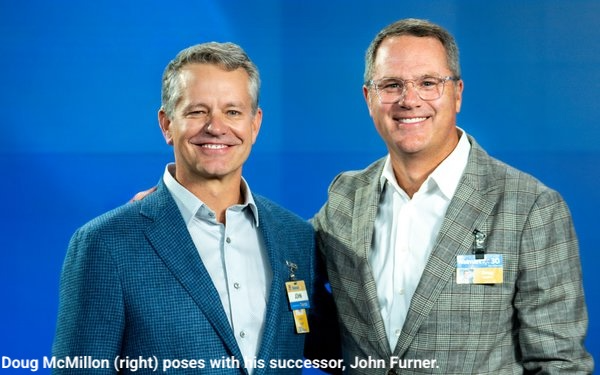
Just in time for
the Black Friday kickoff, Walmart unwrapped a major corporate surprise: longtime chief Doug McMillon is retiring, with John Furner — another company lifer — stepping in as president and
CEO early next year.
Walmart’s late-Thursday announcement is still rippling through the retail world, with analysts reading it as steadying rather than
disruptive. The leadership handoff, days before the company reports quarterly earnings, is widely viewed as a bid for continuity.
“We view this as an orderly, internally driven
succession that maintains strategic continuity rather than signaling a shift in direction,” writes Brett Husslein, analyst at Morningstar. “McMillon departs after a period of strong
growth. We expect Walmart to continue prioritizing its digital and artificial intelligence-led efforts under Furner.”
advertisement
advertisement
McMillon, 59, started at Walmart
in high school unloading trucks and has held the top job for 12 years, navigating COVID, rising ecommerce competition and, more recently, an influx of more affluent grocery shoppers trading down for
value. Furner, 51, also began as an hourly associate and has spent more than 30 years with the company, including six as president of Walmart U.S.
CNBC credits McMillon with pushing Walmart’s most important transformation. “Walmart had been a brick-and-mortar giant
for decades, and McMillon's bet on digital drew some skepticism,” it reports. “It also caused a major stock sell-off… shares plunged as much as 10 percent, causing Walmart to lose
more than $20 billion in market cap.” Those bets ultimately paid off: Annual revenue has risen steadily since 2018, and Walmart’s stock is up nearly 300% since his first day.
Fortunenotes that despite an initial wobble in Walmart’s share
price, analysts believe Furner is the right successor. “The board chose stability… he’s a company lifer who understands the machine from within and can discuss AI without alarming
the two million employees who keep Walmart running.”
That steadiness matters as Walmart defends its Fortune 500 crown. Amazon, at No. 2, is closing the gap and pledging heavier AI
investment to accelerate revenue.
Observers also contrast Walmart’s transition with Target’s. Like Furner, incoming Target CEO Michael Fiddelke is
a company veteran. But many argue Target needs fresh thinking, not familiarity. And while Furner inherits a company beating expectations, Fiddelke steps into a retailer struggling with slipping sales,
shrinking market share, a messy DEI reversal that angered core customers, and broad corporate layoffs.
“The executive shuffle comes at a critical
juncture for the industry — rife with uncertainty over consumer demand and questions over how artificial intelligence will change shopping behavior,” reports Barron’s.
“All John [Furner] is having to do — I say all, but it’s a big ask
— all he’s having to do is, number one, keep things going as they’re going, and add icing onto the cake,” Neil Saunders, managing director and retail analyst at GlobalData
Retail, told Barron’s. “Target is back to baking the cake. It’s putting the ingredients in the mixing bowl still and deciding how they come together.”